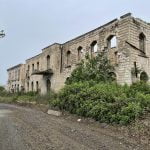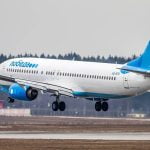The US recently announced two major commitments to funding maritime infrastructure and related commercial projects, one in Sri Lanka and another in Greece through the US International Development Finance Corporation, which is known by the acronym DFC.
When the Trump administration set up the DFC in 2019 by reorganizing several government agencies and increasing available funding through the BUILD Act – Better Utilization of Investments Leading to Development, the primary concept was to provide countries with viable alternatives to Chinese “take it or leave it” infrastructure project proposals, which sometimes faltered and left Beijing in control of strategic facilities.
New container terminal in Sri Lanka
The DFC, on November 8, announced it committed more than half a billion dollars to support the development of a deepwater shipping container terminal in the Port of Colombo, Sri Lanka, that will provide critical infrastructure for the South Asian region.
The DFC’s Chief Executive Officer Scott Nathan traveled to Sri Lanka to launch $553 million in financing to Colombo West International Terminal Private Limited to support the development of the deepwater West Container Terminal located within the Port of Colombo, Sri Lanka’s capital.
Sri Lanka, formerly known as Ceylon, Foreign Minister Ali Sabry and US Ambassador to Sri Lanka Julie Chung joined CEO Nathan for the ceremonial launch of the new terminal.
Nathan explained “The DFC works to drive private-sector investments that advance development and economic growth while strengthening the strategic positions of our partners. That’s what we’re delivering with this infrastructure investment in the Port of Colombo.” He added “Sri Lanka is one of the world’s key transit hubs, with half of all container ships transiting through its waters. DFC’s commitment of $553 million in private-sector loans for the West Container Terminal will expand its shipping capacity, creating greater prosperity for Sri Lanka – without adding to sovereign debt – while at the same time strengthening the position of our allies across the region.”
American Ambassador Julie Chung said “The $553 million investment by DFC for the long-term development of the Port of Colombo’s West Container Terminal will facilitate private-sector-led growth in Sri Lanka and attract crucial foreign exchange inflows during its economic recovery. This financing is symbolic of the United States’ long-standing commitment to the development and well-being of the people of Sri Lanka. Sri Lanka regaining its economic footing will further our shared vision for a free and prosperous Indo-Pacific.”
Regional Impact of this project: increased prosperity in the Indo-Pacific
The Port of Colombo is the largest and busiest transshipment port in the Indian Ocean. It has been operating at more than 90 percent utilization since 2021, signaling its need for additional capacity.
The new terminal reflects DFC’s commitment to financing high-quality infrastructure that supports its partner’s development needs, invests in local communities, and is respectful of local financial conditions.
The investment further demonstrates the United States’ enduring commitment to Sri Lanka’s economic growth and its regional economic integration, including with India. This investment models how DFC operates, supporting projects that are strategic, economically sound, and led by the private sector. DFC is working with world-class sponsors John Keells Holdings and Adani Ports & Special Economic Zones Limited. These companies’ local experience and high-quality standards will help support local jobs and make this project a long-term, sustained success for the Indo-Pacific.
Shipyard upgrade project in Elefsina Greece: “Is it green enough?”
A few days earlier, on November 6, Nathan signed a financing agreement for a $125 million loan to ONEX Elefsis Shipyards and Industries to rehabilitate and modernize the historic Elefsina shipyard near Athens, Greece.
The Elefsina shipyard is strategically located near several key gas trade routes. ONEX will use DFC financing to transform the shipyard into an energy supply hub supporting LNG shipping lanes in the Mediterranean and Aegean seas and supporting Greece’s renewable energy goals. More specifically, ONEX plans to expand the shipyard’s capacity to repair and upgrade ships, particularly ships that service the nearby Revithoussa LNG terminal.
The DFC’s investment is projected to expand the shipyard’s capacity to service up to 200 ships per year. In addition, the new facilities will include a 30MW solar farm to provide energy to the shipyard and to the local grid. The upgrades will include repurposing part of the shipbuilding infrastructure for the fabrication and assembly of wind turbines.
Nathan noted “The DFC’s investment in the Elefsina shipyard will develop a maritime and energy supply hub that will create good local jobs here in Greece and help the country and region become less reliant on Russian energy… DFC is proud to advance this high-quality infrastructure project that will generate more reliable access to energy and foster greater economic growth and prosperity for our partners across the region.”
The new DFC Elefsina arrangement will immediately strike the observant reader as extremely creative to say the least. The previous version of a DFC project at Elefsina including ONEX had been contingent on the sale of US frigates to Greece, with the shipyard modernization loan linked to servicing of those new vessels. When the Greek government decided instead to purchase French frigates, the old ONEX business plan collapsed and the current one emerged from the ashes, now miraculously satisfying US strategic energy policies and including both solar and wind power elements to meet certain American “green” targets.
It should also be recalled that within the DFC and across the international development community in Washington there will be some statutory impediments, as well as significant policy resistance, to using US development finance resources for industrial projects within high income EU countries like Greece; therefore, it would not be surprising if more details emerge in later stages about how this project was “reinvented” and any corners cut.








